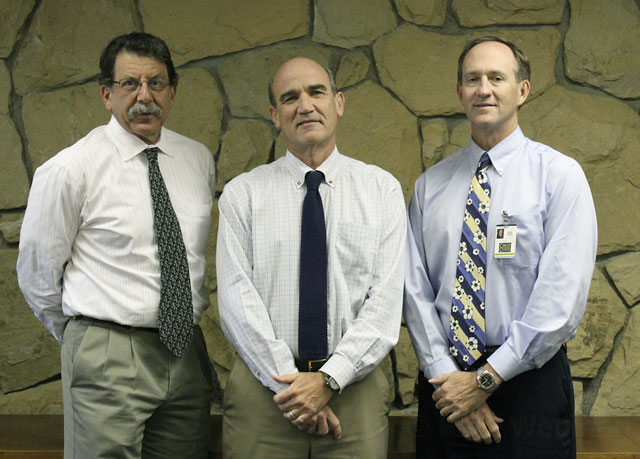Sansum Clinic and Cancer Center Join Forces
Will Start Sharing Resources and Stop Competing for Research Dollars

With the Supreme Court upholding Obamacare last week, changes to the national healthcare system are on the way. But big changes in the Santa Barbara healthcare landscape are afoot as well with two major players — Sansum Clinic and the Cancer Center of Santa Barbara (CCSB) — joining forces.
The merger deal, expected to close in mid September, will, the leaders of both nonprofits believe, form a world-class cancer research and treatment facility. Merger might be a misleading term because Sansum will not swallow the Cancer Center whole. CCSB will remain as a development entity — overseeing an endowment and raising and dispersing funds — with a new name: The Cancer Foundation of Santa Barbara. As part of the reorganization, CCSB will trade two of its trustees for one of Sansum’s, who will join the board of the new foundation.
The Cancer Center’s three medical groups — radiation oncology, medical oncology, and nuclear medicine — will all contract with Sansum now under the informative if unpoetic appellation, “Cancer Center of Santa Barbara with Sansum Clinic.”
While the partnership will result in cost efficiencies, both Rick Scott, president of CCSB, and Dr. Kurt Ransohoff, CEO of Sansum, said it had nothing to do with financial concerns. Scott added that he does not expect any layoffs. Employees whose positions are eliminated at CCSB will, if all goes to plan, be slotted into openings at Sansum.
“The genesis of this merger,” said Ransohoff, “was ‘how can we provide better cancer care?’” As it turns out, there are four answers. CCSB and Sansum will be able to share technology — including the state-of-the-art EPIC medical records system. They will share knowledge and resources. For instance, CCSB operates the only radiation treatment facility in Santa Barbara while Sansum offers one of the largest free colonoscopy screening programs in the country. And they will be able to coordinate care for shared patients.
The biggest upshot, however, may be that they will no longer compete for research and, as a single, more muscular organization, will actually become a destination for research dollars and medical trials. Fred Kass, CCSB medical director of hematology and oncology, said that Sansum and CCSB both recently missed out on trials for a breast cancer medication developed by a large pharmaceutical company that wanted a limited number of sizeable trials. Kass believes that in its new format, Sansum will be able to win such trials, not only making it a major player in cancer research but also benefiting patients who otherwise would not have access to cutting-edge therapies.
At face value, Sansum and CCSB are quite different institutions. The former is the largest healthcare provider on the Central Coast while the latter is more of a boutique that focuses on cancer and offers ancillary services such as genetic counselors, social workers, and nutritionists. Kass stressed, however, that as patients will benefit from more resources, they will see little difference in their care aside from the logo on their doctors’ lab coats. “If we thought for a minute that we would lose that small-town care, we would never have done this,” added Scott.
Although Scott said that the motivation for the partnership was finding “the best clinical model for the community,” he conceded that long term, the costs of compliance — no doubt compounded by Obamacare — will bog down smaller entities like CCSB, which formed a task force last year to investigate the possibility of a merger. “We have to find more efficient ways to deliver health care,” said Scott, referring to the explosion of baby-boomer retirees about to join the ranks of Medicare patients as well as pressure from the federal government to evolve medical accountability and compensation systems. From that perspective, Sansum’s IT infrastructure is likely more vital than dollars and cents to the Cancer Center’s sustainability.
Meanwhile, Kass, explained, the new Sansum-backed Cancer Center, with its outpatient care facilities, will bolster the oncology element of the Neuroscience Center that Cottage Hospital is developing. “I think this is going to be really cool,” he said.



